Evaluating Evidence in Health Promotion and Public Health: A Report
VerifiedAdded on 2023/01/09
|9
|2310
|73
Report
AI Summary
This report delves into the critical role of evidence-based practices within health promotion and public health, specifically addressing the effectiveness of Cognitive Behavioral Therapy (CBT) in treating anxiety disorders in youths. The report begins with an introduction to mental health and the significance of information literacy, followed by an overview of evidence-based public health and the importance of literature reviews. A detailed search strategy, employing the PICO framework and various search filters, is presented, along with an appraisal of a selected article concerning the long-term effectiveness of CBT for youth anxiety disorders. The analysis includes an examination of the article's strengths, limitations, and key findings, such as the comparison between individual and group CBT and the impact of different anxiety diagnoses. The report concludes by summarizing the findings and emphasizing the importance of using credible databases and effective search methodologies to ensure the authenticity of information and the impact of CBT.
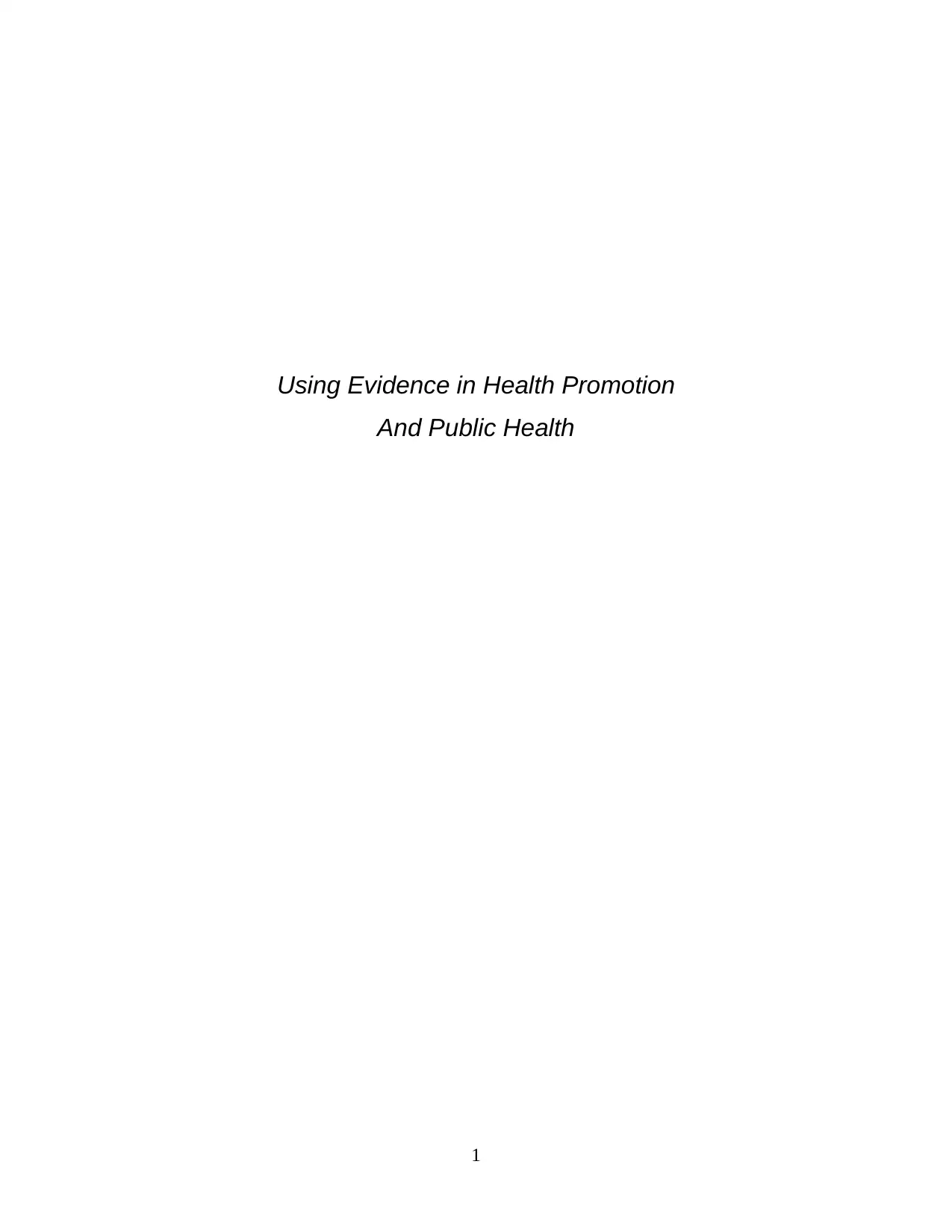
Using Evidence in Health Promotion
And Public Health
1
And Public Health
1
Paraphrase This Document
Need a fresh take? Get an instant paraphrase of this document with our AI Paraphraser
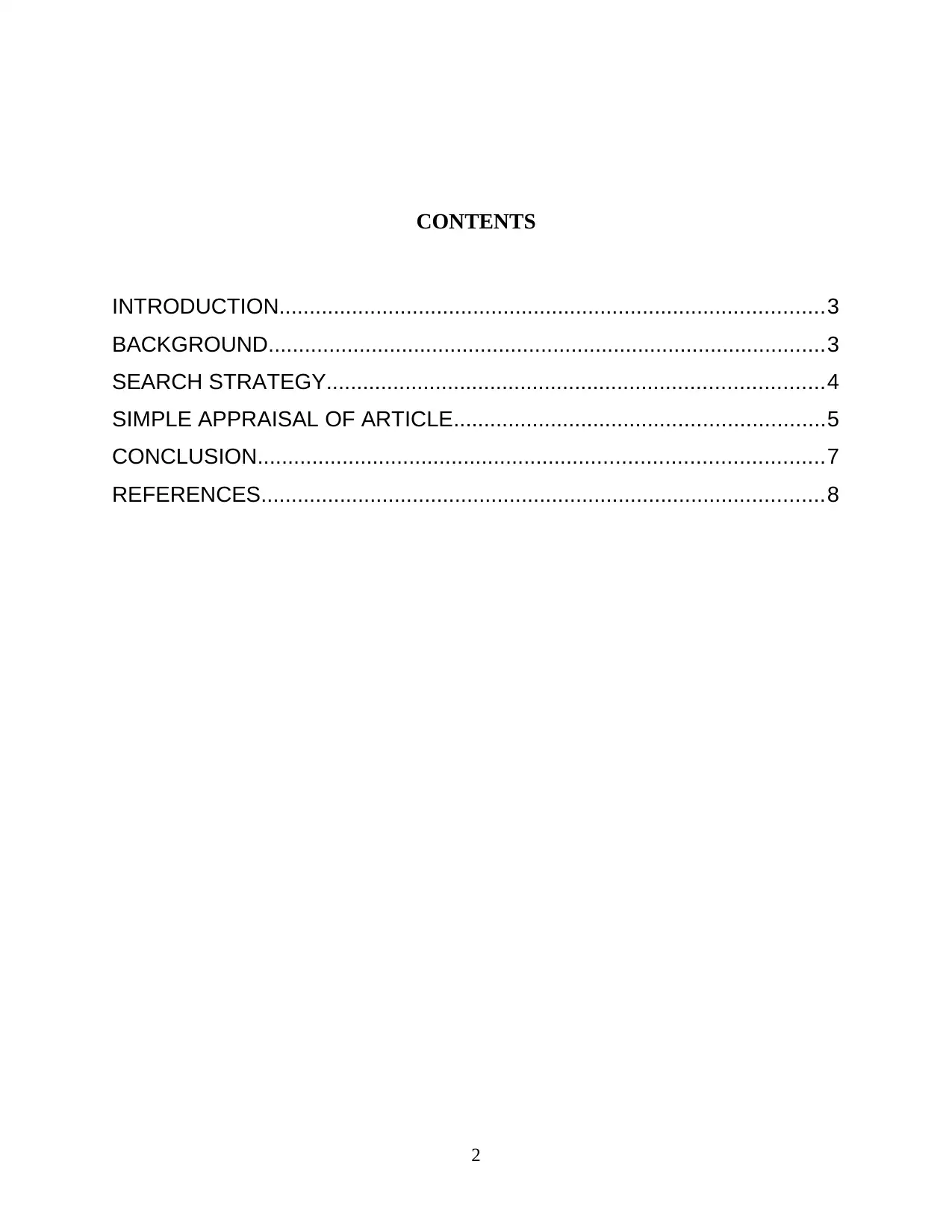
CONTENTS
INTRODUCTION..........................................................................................3
BACKGROUND............................................................................................3
SEARCH STRATEGY..................................................................................4
SIMPLE APPRAISAL OF ARTICLE.............................................................5
CONCLUSION.............................................................................................7
REFERENCES.............................................................................................8
2
INTRODUCTION..........................................................................................3
BACKGROUND............................................................................................3
SEARCH STRATEGY..................................................................................4
SIMPLE APPRAISAL OF ARTICLE.............................................................5
CONCLUSION.............................................................................................7
REFERENCES.............................................................................................8
2
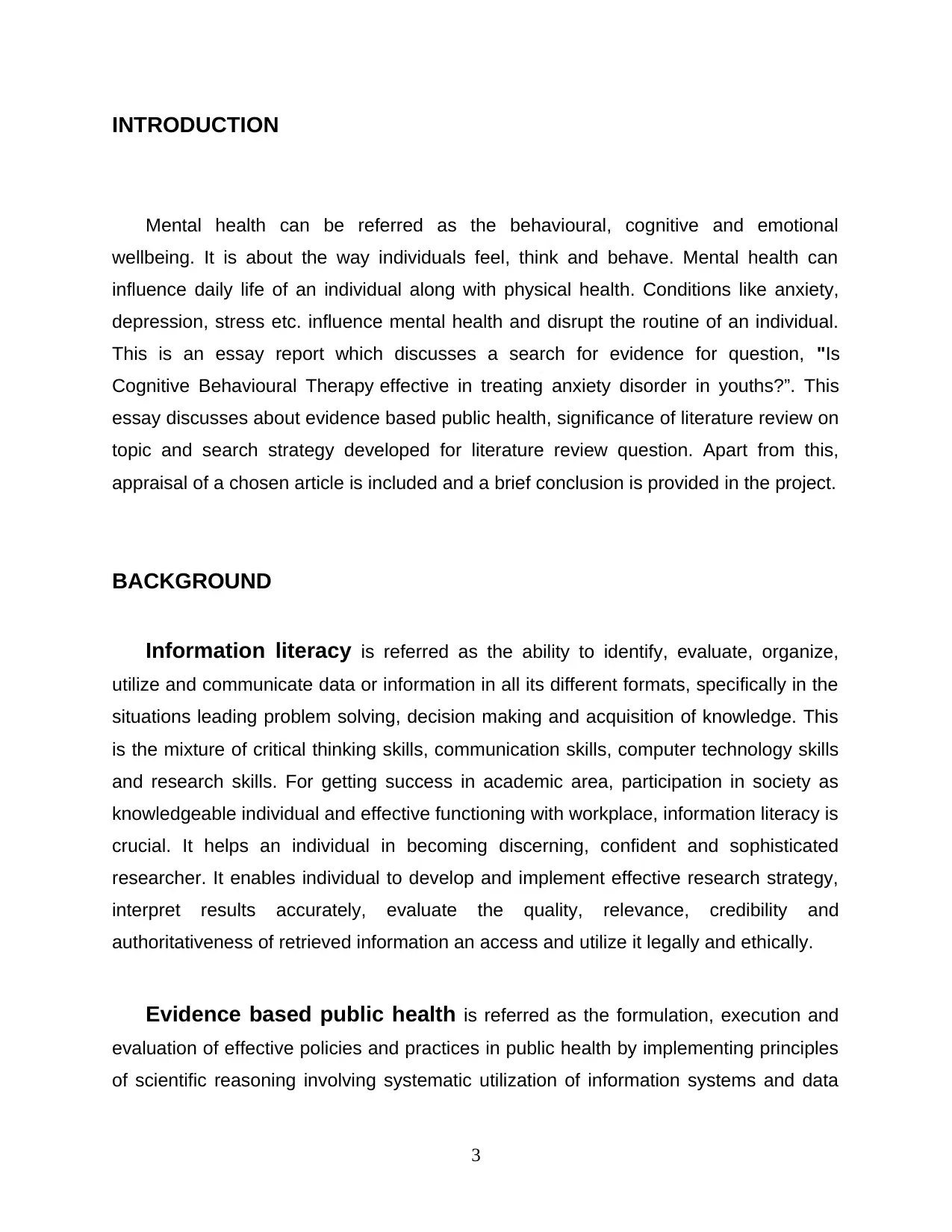
INTRODUCTION
Mental health can be referred as the behavioural, cognitive and emotional
wellbeing. It is about the way individuals feel, think and behave. Mental health can
influence daily life of an individual along with physical health. Conditions like anxiety,
depression, stress etc. influence mental health and disrupt the routine of an individual.
This is an essay report which discusses a search for evidence for question, "Is
Cognitive Behavioural Therapy effective in treating anxiety disorder in youths?”. This
essay discusses about evidence based public health, significance of literature review on
topic and search strategy developed for literature review question. Apart from this,
appraisal of a chosen article is included and a brief conclusion is provided in the project.
BACKGROUND
Information literacy is referred as the ability to identify, evaluate, organize,
utilize and communicate data or information in all its different formats, specifically in the
situations leading problem solving, decision making and acquisition of knowledge. This
is the mixture of critical thinking skills, communication skills, computer technology skills
and research skills. For getting success in academic area, participation in society as
knowledgeable individual and effective functioning with workplace, information literacy is
crucial. It helps an individual in becoming discerning, confident and sophisticated
researcher. It enables individual to develop and implement effective research strategy,
interpret results accurately, evaluate the quality, relevance, credibility and
authoritativeness of retrieved information an access and utilize it legally and ethically.
Evidence based public health is referred as the formulation, execution and
evaluation of effective policies and practices in public health by implementing principles
of scientific reasoning involving systematic utilization of information systems and data
3
Mental health can be referred as the behavioural, cognitive and emotional
wellbeing. It is about the way individuals feel, think and behave. Mental health can
influence daily life of an individual along with physical health. Conditions like anxiety,
depression, stress etc. influence mental health and disrupt the routine of an individual.
This is an essay report which discusses a search for evidence for question, "Is
Cognitive Behavioural Therapy effective in treating anxiety disorder in youths?”. This
essay discusses about evidence based public health, significance of literature review on
topic and search strategy developed for literature review question. Apart from this,
appraisal of a chosen article is included and a brief conclusion is provided in the project.
BACKGROUND
Information literacy is referred as the ability to identify, evaluate, organize,
utilize and communicate data or information in all its different formats, specifically in the
situations leading problem solving, decision making and acquisition of knowledge. This
is the mixture of critical thinking skills, communication skills, computer technology skills
and research skills. For getting success in academic area, participation in society as
knowledgeable individual and effective functioning with workplace, information literacy is
crucial. It helps an individual in becoming discerning, confident and sophisticated
researcher. It enables individual to develop and implement effective research strategy,
interpret results accurately, evaluate the quality, relevance, credibility and
authoritativeness of retrieved information an access and utilize it legally and ethically.
Evidence based public health is referred as the formulation, execution and
evaluation of effective policies and practices in public health by implementing principles
of scientific reasoning involving systematic utilization of information systems and data
3
⊘ This is a preview!⊘
Do you want full access?
Subscribe today to unlock all pages.

Trusted by 1+ million students worldwide
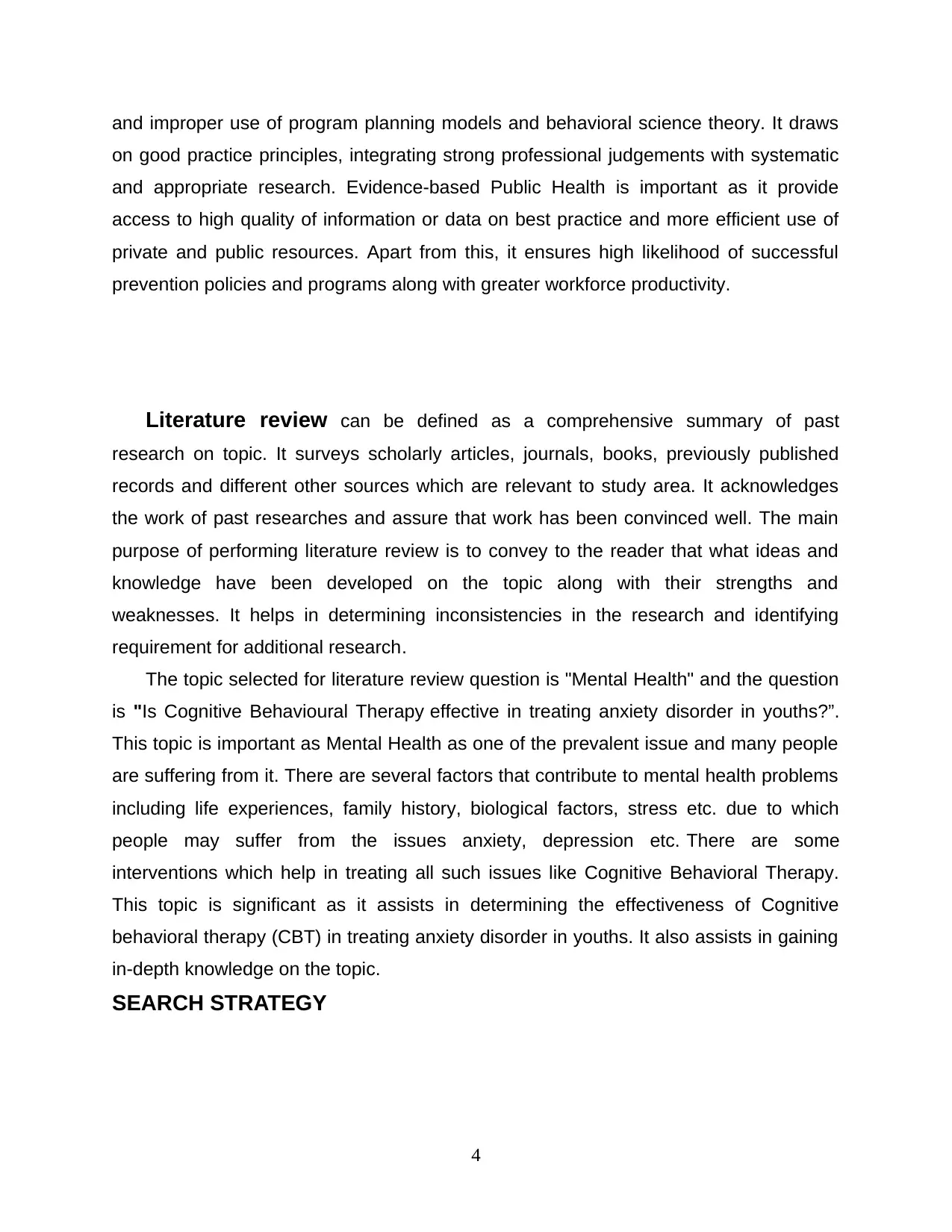
and improper use of program planning models and behavioral science theory. It draws
on good practice principles, integrating strong professional judgements with systematic
and appropriate research. Evidence-based Public Health is important as it provide
access to high quality of information or data on best practice and more efficient use of
private and public resources. Apart from this, it ensures high likelihood of successful
prevention policies and programs along with greater workforce productivity.
Literature review can be defined as a comprehensive summary of past
research on topic. It surveys scholarly articles, journals, books, previously published
records and different other sources which are relevant to study area. It acknowledges
the work of past researches and assure that work has been convinced well. The main
purpose of performing literature review is to convey to the reader that what ideas and
knowledge have been developed on the topic along with their strengths and
weaknesses. It helps in determining inconsistencies in the research and identifying
requirement for additional research.
The topic selected for literature review question is "Mental Health" and the question
is "Is Cognitive Behavioural Therapy effective in treating anxiety disorder in youths?”.
This topic is important as Mental Health as one of the prevalent issue and many people
are suffering from it. There are several factors that contribute to mental health problems
including life experiences, family history, biological factors, stress etc. due to which
people may suffer from the issues anxiety, depression etc. There are some
interventions which help in treating all such issues like Cognitive Behavioral Therapy.
This topic is significant as it assists in determining the effectiveness of Cognitive
behavioral therapy (CBT) in treating anxiety disorder in youths. It also assists in gaining
in-depth knowledge on the topic.
SEARCH STRATEGY
4
on good practice principles, integrating strong professional judgements with systematic
and appropriate research. Evidence-based Public Health is important as it provide
access to high quality of information or data on best practice and more efficient use of
private and public resources. Apart from this, it ensures high likelihood of successful
prevention policies and programs along with greater workforce productivity.
Literature review can be defined as a comprehensive summary of past
research on topic. It surveys scholarly articles, journals, books, previously published
records and different other sources which are relevant to study area. It acknowledges
the work of past researches and assure that work has been convinced well. The main
purpose of performing literature review is to convey to the reader that what ideas and
knowledge have been developed on the topic along with their strengths and
weaknesses. It helps in determining inconsistencies in the research and identifying
requirement for additional research.
The topic selected for literature review question is "Mental Health" and the question
is "Is Cognitive Behavioural Therapy effective in treating anxiety disorder in youths?”.
This topic is important as Mental Health as one of the prevalent issue and many people
are suffering from it. There are several factors that contribute to mental health problems
including life experiences, family history, biological factors, stress etc. due to which
people may suffer from the issues anxiety, depression etc. There are some
interventions which help in treating all such issues like Cognitive Behavioral Therapy.
This topic is significant as it assists in determining the effectiveness of Cognitive
behavioral therapy (CBT) in treating anxiety disorder in youths. It also assists in gaining
in-depth knowledge on the topic.
SEARCH STRATEGY
4
Paraphrase This Document
Need a fresh take? Get an instant paraphrase of this document with our AI Paraphraser
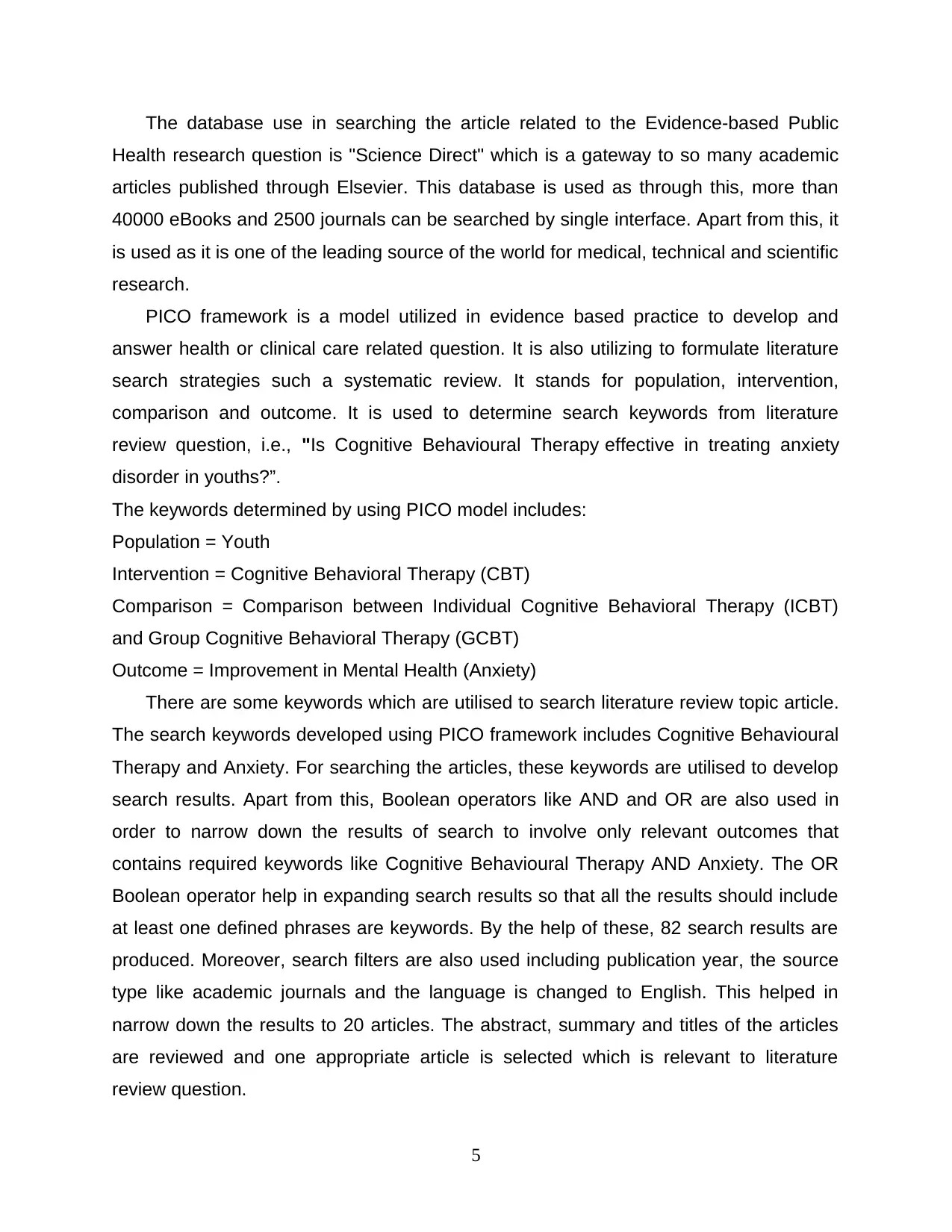
The database use in searching the article related to the Evidence-based Public
Health research question is "Science Direct" which is a gateway to so many academic
articles published through Elsevier. This database is used as through this, more than
40000 eBooks and 2500 journals can be searched by single interface. Apart from this, it
is used as it is one of the leading source of the world for medical, technical and scientific
research.
PICO framework is a model utilized in evidence based practice to develop and
answer health or clinical care related question. It is also utilizing to formulate literature
search strategies such a systematic review. It stands for population, intervention,
comparison and outcome. It is used to determine search keywords from literature
review question, i.e., "Is Cognitive Behavioural Therapy effective in treating anxiety
disorder in youths?”.
The keywords determined by using PICO model includes:
Population = Youth
Intervention = Cognitive Behavioral Therapy (CBT)
Comparison = Comparison between Individual Cognitive Behavioral Therapy (ICBT)
and Group Cognitive Behavioral Therapy (GCBT)
Outcome = Improvement in Mental Health (Anxiety)
There are some keywords which are utilised to search literature review topic article.
The search keywords developed using PICO framework includes Cognitive Behavioural
Therapy and Anxiety. For searching the articles, these keywords are utilised to develop
search results. Apart from this, Boolean operators like AND and OR are also used in
order to narrow down the results of search to involve only relevant outcomes that
contains required keywords like Cognitive Behavioural Therapy AND Anxiety. The OR
Boolean operator help in expanding search results so that all the results should include
at least one defined phrases are keywords. By the help of these, 82 search results are
produced. Moreover, search filters are also used including publication year, the source
type like academic journals and the language is changed to English. This helped in
narrow down the results to 20 articles. The abstract, summary and titles of the articles
are reviewed and one appropriate article is selected which is relevant to literature
review question.
5
Health research question is "Science Direct" which is a gateway to so many academic
articles published through Elsevier. This database is used as through this, more than
40000 eBooks and 2500 journals can be searched by single interface. Apart from this, it
is used as it is one of the leading source of the world for medical, technical and scientific
research.
PICO framework is a model utilized in evidence based practice to develop and
answer health or clinical care related question. It is also utilizing to formulate literature
search strategies such a systematic review. It stands for population, intervention,
comparison and outcome. It is used to determine search keywords from literature
review question, i.e., "Is Cognitive Behavioural Therapy effective in treating anxiety
disorder in youths?”.
The keywords determined by using PICO model includes:
Population = Youth
Intervention = Cognitive Behavioral Therapy (CBT)
Comparison = Comparison between Individual Cognitive Behavioral Therapy (ICBT)
and Group Cognitive Behavioral Therapy (GCBT)
Outcome = Improvement in Mental Health (Anxiety)
There are some keywords which are utilised to search literature review topic article.
The search keywords developed using PICO framework includes Cognitive Behavioural
Therapy and Anxiety. For searching the articles, these keywords are utilised to develop
search results. Apart from this, Boolean operators like AND and OR are also used in
order to narrow down the results of search to involve only relevant outcomes that
contains required keywords like Cognitive Behavioural Therapy AND Anxiety. The OR
Boolean operator help in expanding search results so that all the results should include
at least one defined phrases are keywords. By the help of these, 82 search results are
produced. Moreover, search filters are also used including publication year, the source
type like academic journals and the language is changed to English. This helped in
narrow down the results to 20 articles. The abstract, summary and titles of the articles
are reviewed and one appropriate article is selected which is relevant to literature
review question.
5
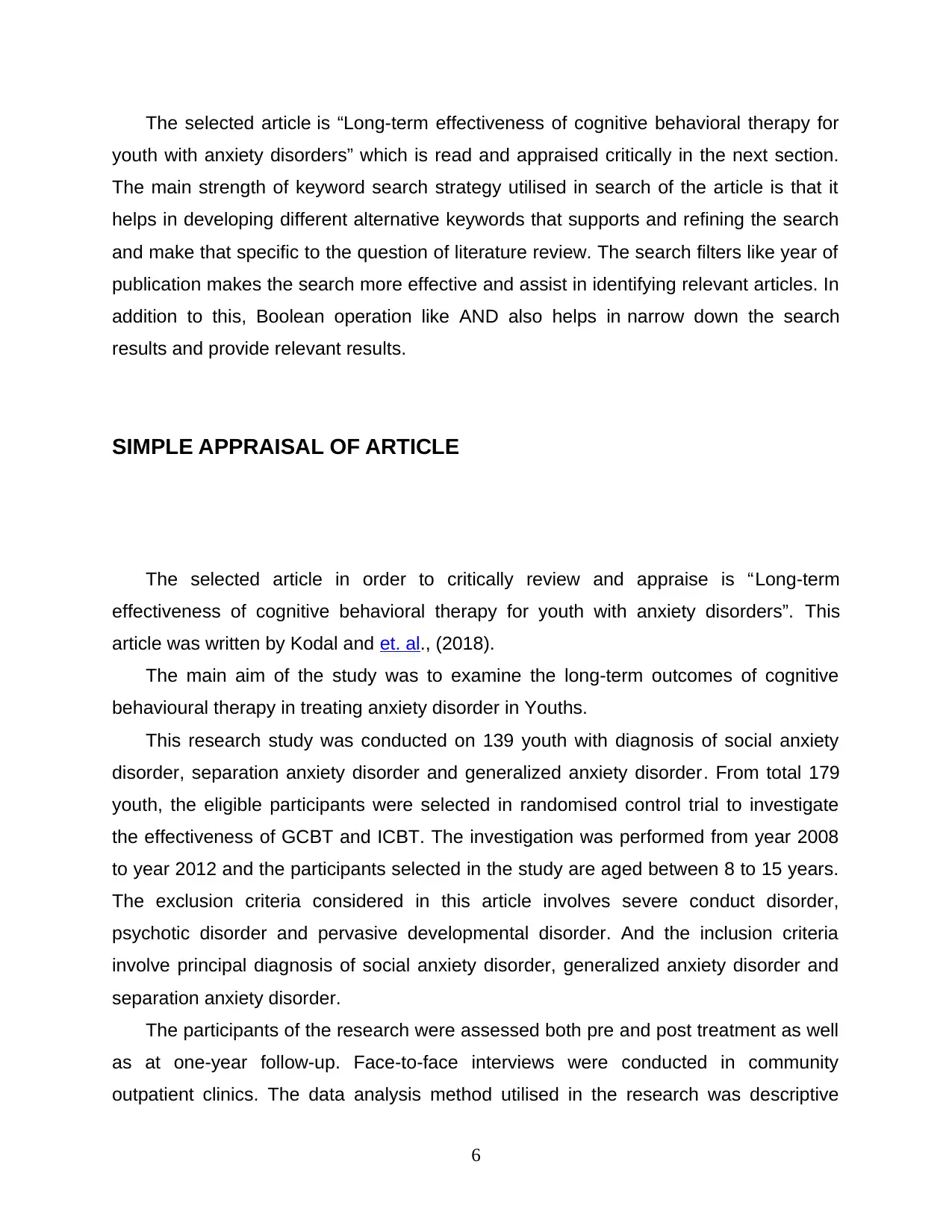
The selected article is “Long-term effectiveness of cognitive behavioral therapy for
youth with anxiety disorders” which is read and appraised critically in the next section.
The main strength of keyword search strategy utilised in search of the article is that it
helps in developing different alternative keywords that supports and refining the search
and make that specific to the question of literature review. The search filters like year of
publication makes the search more effective and assist in identifying relevant articles. In
addition to this, Boolean operation like AND also helps in narrow down the search
results and provide relevant results.
SIMPLE APPRAISAL OF ARTICLE
The selected article in order to critically review and appraise is “Long-term
effectiveness of cognitive behavioral therapy for youth with anxiety disorders”. This
article was written by Kodal and et. al., (2018).
The main aim of the study was to examine the long-term outcomes of cognitive
behavioural therapy in treating anxiety disorder in Youths.
This research study was conducted on 139 youth with diagnosis of social anxiety
disorder, separation anxiety disorder and generalized anxiety disorder. From total 179
youth, the eligible participants were selected in randomised control trial to investigate
the effectiveness of GCBT and ICBT. The investigation was performed from year 2008
to year 2012 and the participants selected in the study are aged between 8 to 15 years.
The exclusion criteria considered in this article involves severe conduct disorder,
psychotic disorder and pervasive developmental disorder. And the inclusion criteria
involve principal diagnosis of social anxiety disorder, generalized anxiety disorder and
separation anxiety disorder.
The participants of the research were assessed both pre and post treatment as well
as at one-year follow-up. Face-to-face interviews were conducted in community
outpatient clinics. The data analysis method utilised in the research was descriptive
6
youth with anxiety disorders” which is read and appraised critically in the next section.
The main strength of keyword search strategy utilised in search of the article is that it
helps in developing different alternative keywords that supports and refining the search
and make that specific to the question of literature review. The search filters like year of
publication makes the search more effective and assist in identifying relevant articles. In
addition to this, Boolean operation like AND also helps in narrow down the search
results and provide relevant results.
SIMPLE APPRAISAL OF ARTICLE
The selected article in order to critically review and appraise is “Long-term
effectiveness of cognitive behavioral therapy for youth with anxiety disorders”. This
article was written by Kodal and et. al., (2018).
The main aim of the study was to examine the long-term outcomes of cognitive
behavioural therapy in treating anxiety disorder in Youths.
This research study was conducted on 139 youth with diagnosis of social anxiety
disorder, separation anxiety disorder and generalized anxiety disorder. From total 179
youth, the eligible participants were selected in randomised control trial to investigate
the effectiveness of GCBT and ICBT. The investigation was performed from year 2008
to year 2012 and the participants selected in the study are aged between 8 to 15 years.
The exclusion criteria considered in this article involves severe conduct disorder,
psychotic disorder and pervasive developmental disorder. And the inclusion criteria
involve principal diagnosis of social anxiety disorder, generalized anxiety disorder and
separation anxiety disorder.
The participants of the research were assessed both pre and post treatment as well
as at one-year follow-up. Face-to-face interviews were conducted in community
outpatient clinics. The data analysis method utilised in the research was descriptive
6
⊘ This is a preview!⊘
Do you want full access?
Subscribe today to unlock all pages.

Trusted by 1+ million students worldwide
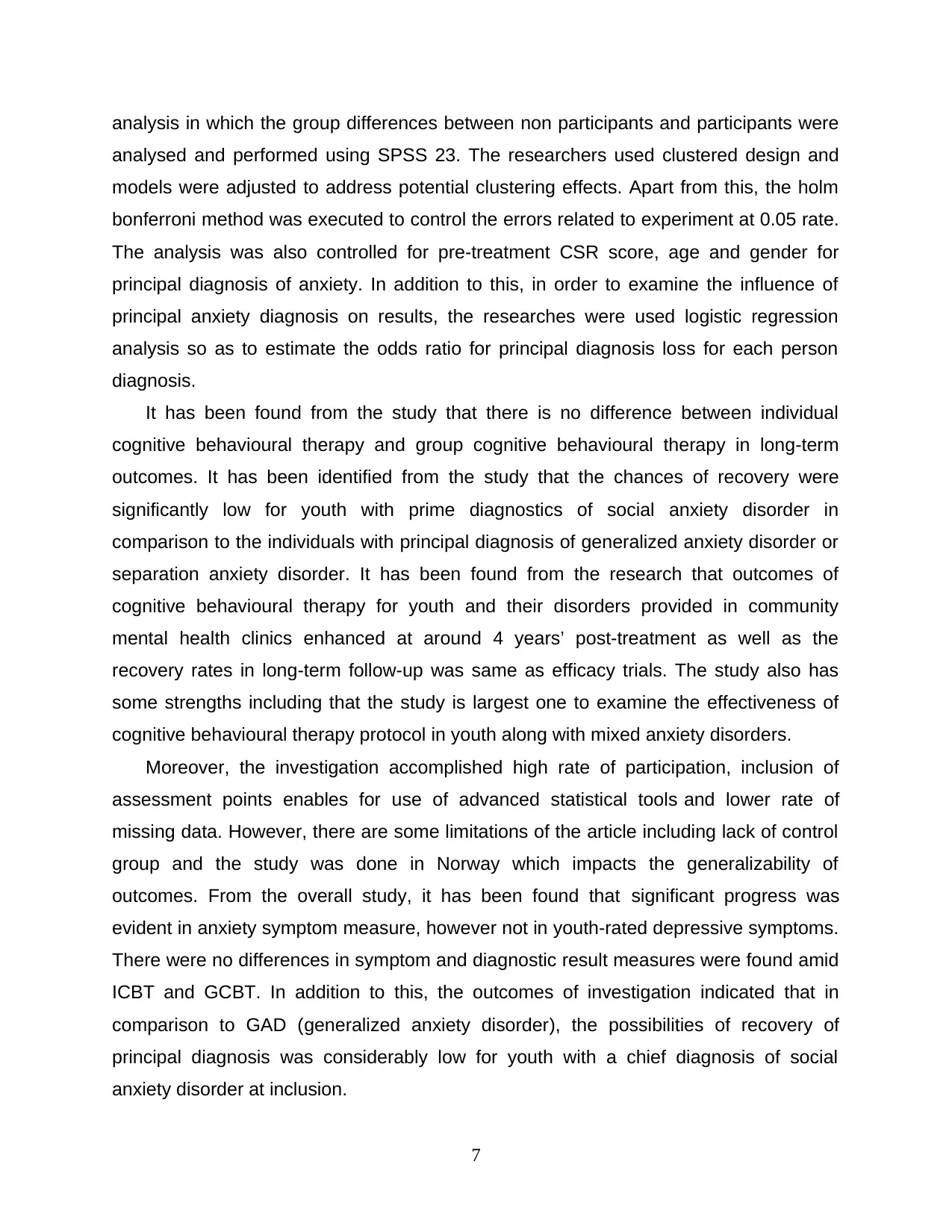
analysis in which the group differences between non participants and participants were
analysed and performed using SPSS 23. The researchers used clustered design and
models were adjusted to address potential clustering effects. Apart from this, the holm
bonferroni method was executed to control the errors related to experiment at 0.05 rate.
The analysis was also controlled for pre-treatment CSR score, age and gender for
principal diagnosis of anxiety. In addition to this, in order to examine the influence of
principal anxiety diagnosis on results, the researches were used logistic regression
analysis so as to estimate the odds ratio for principal diagnosis loss for each person
diagnosis.
It has been found from the study that there is no difference between individual
cognitive behavioural therapy and group cognitive behavioural therapy in long-term
outcomes. It has been identified from the study that the chances of recovery were
significantly low for youth with prime diagnostics of social anxiety disorder in
comparison to the individuals with principal diagnosis of generalized anxiety disorder or
separation anxiety disorder. It has been found from the research that outcomes of
cognitive behavioural therapy for youth and their disorders provided in community
mental health clinics enhanced at around 4 years’ post-treatment as well as the
recovery rates in long-term follow-up was same as efficacy trials. The study also has
some strengths including that the study is largest one to examine the effectiveness of
cognitive behavioural therapy protocol in youth along with mixed anxiety disorders.
Moreover, the investigation accomplished high rate of participation, inclusion of
assessment points enables for use of advanced statistical tools and lower rate of
missing data. However, there are some limitations of the article including lack of control
group and the study was done in Norway which impacts the generalizability of
outcomes. From the overall study, it has been found that significant progress was
evident in anxiety symptom measure, however not in youth-rated depressive symptoms.
There were no differences in symptom and diagnostic result measures were found amid
ICBT and GCBT. In addition to this, the outcomes of investigation indicated that in
comparison to GAD (generalized anxiety disorder), the possibilities of recovery of
principal diagnosis was considerably low for youth with a chief diagnosis of social
anxiety disorder at inclusion.
7
analysed and performed using SPSS 23. The researchers used clustered design and
models were adjusted to address potential clustering effects. Apart from this, the holm
bonferroni method was executed to control the errors related to experiment at 0.05 rate.
The analysis was also controlled for pre-treatment CSR score, age and gender for
principal diagnosis of anxiety. In addition to this, in order to examine the influence of
principal anxiety diagnosis on results, the researches were used logistic regression
analysis so as to estimate the odds ratio for principal diagnosis loss for each person
diagnosis.
It has been found from the study that there is no difference between individual
cognitive behavioural therapy and group cognitive behavioural therapy in long-term
outcomes. It has been identified from the study that the chances of recovery were
significantly low for youth with prime diagnostics of social anxiety disorder in
comparison to the individuals with principal diagnosis of generalized anxiety disorder or
separation anxiety disorder. It has been found from the research that outcomes of
cognitive behavioural therapy for youth and their disorders provided in community
mental health clinics enhanced at around 4 years’ post-treatment as well as the
recovery rates in long-term follow-up was same as efficacy trials. The study also has
some strengths including that the study is largest one to examine the effectiveness of
cognitive behavioural therapy protocol in youth along with mixed anxiety disorders.
Moreover, the investigation accomplished high rate of participation, inclusion of
assessment points enables for use of advanced statistical tools and lower rate of
missing data. However, there are some limitations of the article including lack of control
group and the study was done in Norway which impacts the generalizability of
outcomes. From the overall study, it has been found that significant progress was
evident in anxiety symptom measure, however not in youth-rated depressive symptoms.
There were no differences in symptom and diagnostic result measures were found amid
ICBT and GCBT. In addition to this, the outcomes of investigation indicated that in
comparison to GAD (generalized anxiety disorder), the possibilities of recovery of
principal diagnosis was considerably low for youth with a chief diagnosis of social
anxiety disorder at inclusion.
7
Paraphrase This Document
Need a fresh take? Get an instant paraphrase of this document with our AI Paraphraser
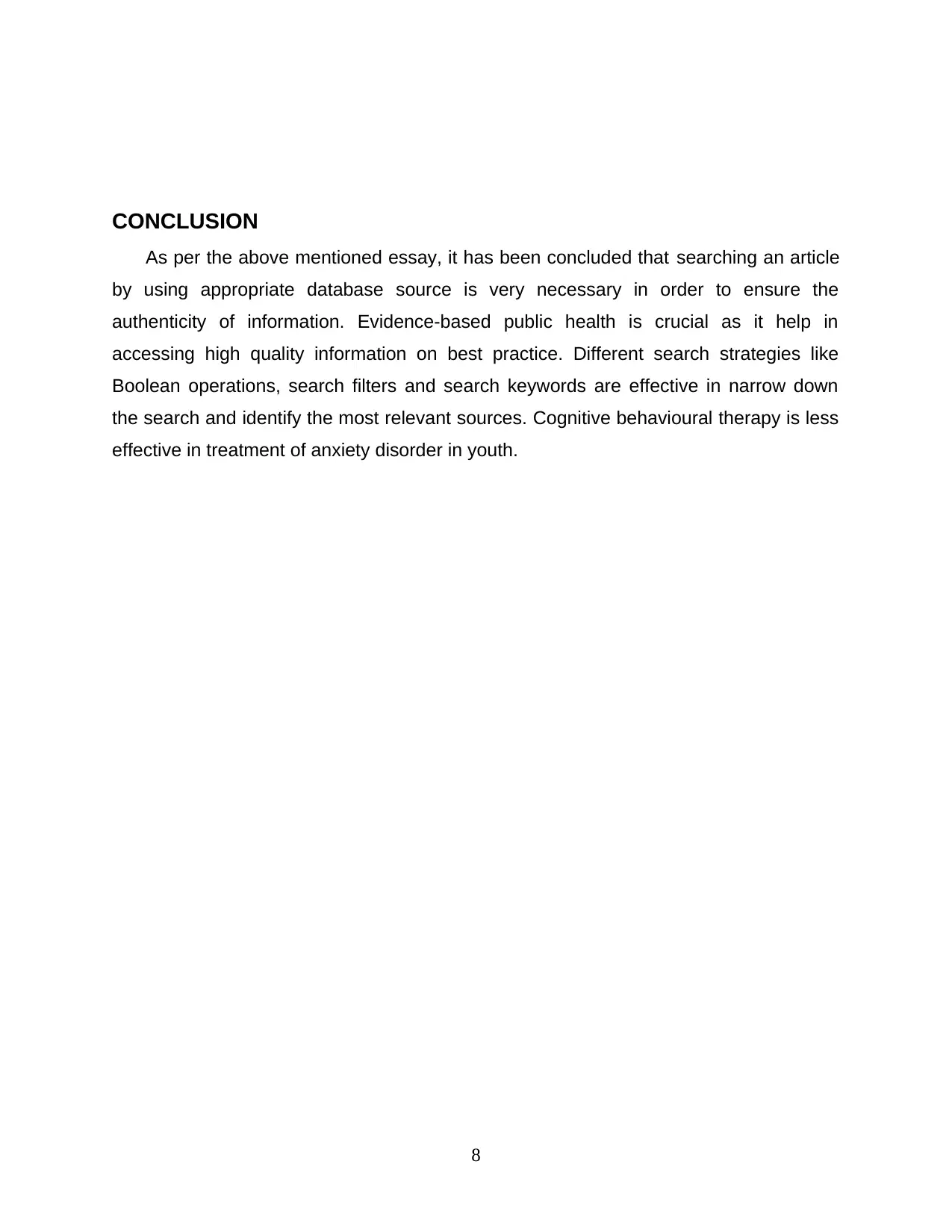
CONCLUSION
As per the above mentioned essay, it has been concluded that searching an article
by using appropriate database source is very necessary in order to ensure the
authenticity of information. Evidence-based public health is crucial as it help in
accessing high quality information on best practice. Different search strategies like
Boolean operations, search filters and search keywords are effective in narrow down
the search and identify the most relevant sources. Cognitive behavioural therapy is less
effective in treatment of anxiety disorder in youth.
8
As per the above mentioned essay, it has been concluded that searching an article
by using appropriate database source is very necessary in order to ensure the
authenticity of information. Evidence-based public health is crucial as it help in
accessing high quality information on best practice. Different search strategies like
Boolean operations, search filters and search keywords are effective in narrow down
the search and identify the most relevant sources. Cognitive behavioural therapy is less
effective in treatment of anxiety disorder in youth.
8
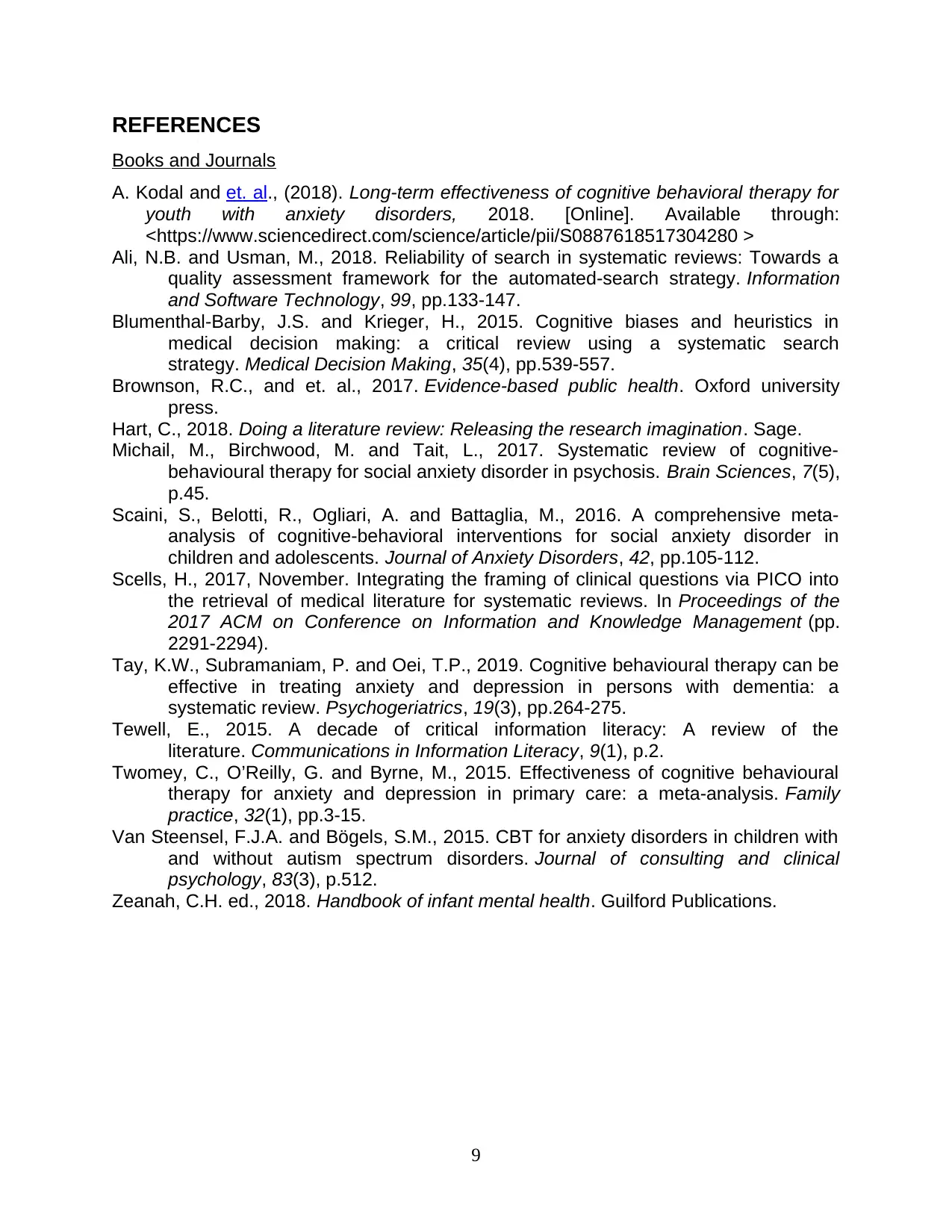
REFERENCES
Books and Journals
A. Kodal and et. al., (2018). Long-term effectiveness of cognitive behavioral therapy for
youth with anxiety disorders, 2018. [Online]. Available through:
<https://www.sciencedirect.com/science/article/pii/S0887618517304280 >
Ali, N.B. and Usman, M., 2018. Reliability of search in systematic reviews: Towards a
quality assessment framework for the automated-search strategy. Information
and Software Technology, 99, pp.133-147.
Blumenthal-Barby, J.S. and Krieger, H., 2015. Cognitive biases and heuristics in
medical decision making: a critical review using a systematic search
strategy. Medical Decision Making, 35(4), pp.539-557.
Brownson, R.C., and et. al., 2017. Evidence-based public health. Oxford university
press.
Hart, C., 2018. Doing a literature review: Releasing the research imagination. Sage.
Michail, M., Birchwood, M. and Tait, L., 2017. Systematic review of cognitive-
behavioural therapy for social anxiety disorder in psychosis. Brain Sciences, 7(5),
p.45.
Scaini, S., Belotti, R., Ogliari, A. and Battaglia, M., 2016. A comprehensive meta-
analysis of cognitive-behavioral interventions for social anxiety disorder in
children and adolescents. Journal of Anxiety Disorders, 42, pp.105-112.
Scells, H., 2017, November. Integrating the framing of clinical questions via PICO into
the retrieval of medical literature for systematic reviews. In Proceedings of the
2017 ACM on Conference on Information and Knowledge Management (pp.
2291-2294).
Tay, K.W., Subramaniam, P. and Oei, T.P., 2019. Cognitive behavioural therapy can be
effective in treating anxiety and depression in persons with dementia: a
systematic review. Psychogeriatrics, 19(3), pp.264-275.
Tewell, E., 2015. A decade of critical information literacy: A review of the
literature. Communications in Information Literacy, 9(1), p.2.
Twomey, C., O’Reilly, G. and Byrne, M., 2015. Effectiveness of cognitive behavioural
therapy for anxiety and depression in primary care: a meta-analysis. Family
practice, 32(1), pp.3-15.
Van Steensel, F.J.A. and Bögels, S.M., 2015. CBT for anxiety disorders in children with
and without autism spectrum disorders. Journal of consulting and clinical
psychology, 83(3), p.512.
Zeanah, C.H. ed., 2018. Handbook of infant mental health. Guilford Publications.
9
Books and Journals
A. Kodal and et. al., (2018). Long-term effectiveness of cognitive behavioral therapy for
youth with anxiety disorders, 2018. [Online]. Available through:
<https://www.sciencedirect.com/science/article/pii/S0887618517304280 >
Ali, N.B. and Usman, M., 2018. Reliability of search in systematic reviews: Towards a
quality assessment framework for the automated-search strategy. Information
and Software Technology, 99, pp.133-147.
Blumenthal-Barby, J.S. and Krieger, H., 2015. Cognitive biases and heuristics in
medical decision making: a critical review using a systematic search
strategy. Medical Decision Making, 35(4), pp.539-557.
Brownson, R.C., and et. al., 2017. Evidence-based public health. Oxford university
press.
Hart, C., 2018. Doing a literature review: Releasing the research imagination. Sage.
Michail, M., Birchwood, M. and Tait, L., 2017. Systematic review of cognitive-
behavioural therapy for social anxiety disorder in psychosis. Brain Sciences, 7(5),
p.45.
Scaini, S., Belotti, R., Ogliari, A. and Battaglia, M., 2016. A comprehensive meta-
analysis of cognitive-behavioral interventions for social anxiety disorder in
children and adolescents. Journal of Anxiety Disorders, 42, pp.105-112.
Scells, H., 2017, November. Integrating the framing of clinical questions via PICO into
the retrieval of medical literature for systematic reviews. In Proceedings of the
2017 ACM on Conference on Information and Knowledge Management (pp.
2291-2294).
Tay, K.W., Subramaniam, P. and Oei, T.P., 2019. Cognitive behavioural therapy can be
effective in treating anxiety and depression in persons with dementia: a
systematic review. Psychogeriatrics, 19(3), pp.264-275.
Tewell, E., 2015. A decade of critical information literacy: A review of the
literature. Communications in Information Literacy, 9(1), p.2.
Twomey, C., O’Reilly, G. and Byrne, M., 2015. Effectiveness of cognitive behavioural
therapy for anxiety and depression in primary care: a meta-analysis. Family
practice, 32(1), pp.3-15.
Van Steensel, F.J.A. and Bögels, S.M., 2015. CBT for anxiety disorders in children with
and without autism spectrum disorders. Journal of consulting and clinical
psychology, 83(3), p.512.
Zeanah, C.H. ed., 2018. Handbook of infant mental health. Guilford Publications.
9
⊘ This is a preview!⊘
Do you want full access?
Subscribe today to unlock all pages.

Trusted by 1+ million students worldwide
1 out of 9
Related Documents
Your All-in-One AI-Powered Toolkit for Academic Success.
+13062052269
info@desklib.com
Available 24*7 on WhatsApp / Email
![[object Object]](/_next/static/media/star-bottom.7253800d.svg)
Unlock your academic potential
Copyright © 2020–2026 A2Z Services. All Rights Reserved. Developed and managed by ZUCOL.




